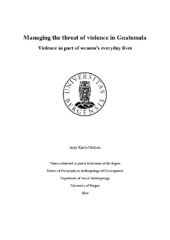Managing the threat of violence in Guatemala: Violence as part of women's everyday lives
Master thesis
Permanent lenke
https://hdl.handle.net/1956/8712Utgivelsesdato
2014-07-30Metadata
Vis full innførselSamlinger
Sammendrag
In this thesis I explore the prevalence of violence against women in Guatemala. Violence is considered a part of everyday life because it has become normalized. By normal" I refer to both the frequency of the act and its perceived legitimacy. Due to this normalization, much violence is considered something women should simply endure. Although women suffer different types of violence, I argue that they must be seen within the same framework and I show how violence in public and private sphere cannot be separated. Violent practices have become normatively supported, largely based on gender expectations, such as women's morality. Gender inequalities have not only enabled normalization, but to a large degree societal acceptance of violence. The result has been that women have often been blamed for violence perpetrated against them, particularly those who transgress moral and physical gender boundaries. There is a widespread notion that violence rarely happens to good women". Gender ideology permeates much of Guatemalan society, both on the street, in the home, in the courtroom, and at the scene of the crime. Impunity has reigned in cases of violence and women's (perceived) morality has affected the outcome of investigations. I explore how some women have not been considered worthy" victims (as opposed to others), largely based on morality, class, and ethnicity. I show how there is a continuum of violence in women's lives. Violence is not only prevalent, but women experience several types of violence on an everyday basis. Because both the home and the street" present palpable dangers to women, and because violence in the street penetrates the perceived safety of the home, there are no safe-zones" in women's lives. What becomes important, then, is managing the constant threat of violence and fear. I explore women's fear as political fear because societal structures have enabled normalization of violence against women.
